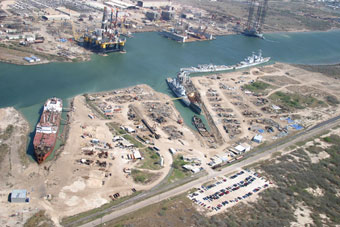NORTH AMERICAN REPORTS
Reborn in the USA:
ISL Expanding Texas
Ship Scrapping
ISL Expanding Texas
Ship Scrapping
| T |
he shipbreaking business can stir up a tsunami of knee- jerk NIMBY- ism. Precious few communities greet proposed ship- disposal operations with open arms.
That's not altogether surprising,
 |
| This is an aerial view of ISL's shipbreaking operation in Brownsville, the largest in the U.S. |
International Shipbreaking Ltd. (ISL), however, works in a whole other world at the Port of Brownsville, where it's growing.
"The port really appreciates what we do here," ISL co- founder and Director Michael Donovan tells Site Selection. "It's a very congenial atmosphere, very supportive."
ISL came to the Texas port in 1995, when Donovan and Kevin McCabe, two long- time finance industry veterans, founded the company. ISL has since expanded to rank as the leading U.S. shipbreaker in disposal volume and capacity. Its dismantling facility is America's largest, capable of simultaneously breaking nine vessels.
Industry Bunched in Brownsville
"We chose to locate ISL in Brownsville in part because the best people we've found in this business were operating here and had been for 30 to 40 years," Donovan recounted. "So there was skilled labor plus a very good maritime environment at a purely industrial port. The port is a huge driver in this thing."
Ten years ago, though, the U.S. business had slowed to a crawl. The end seemed imminent.
Instead, American shipbreaking has been reborn, revitalized by an improbable trio: skyrocketing industrial demand for scrap metal, stronger environmental standards, and governmental action.
'Adding Value to Ship Pieces'
"RGS is legally referred to as an affiliated company," explains Donovan, who is RGS's treasurer. "It's totally separate from ISL." However legally distinct they may be, ISL and RGS are linked to add new business to an old- line industry.
"We thought it would be interesting to diversify out of ships into other types of metal," Donovan explained. "There's this circular link- in between the marine environment and the skilled labor here, with a lot of capable people in welding. That's very a big resource when you add value to the ship's pieces, rather than just crunching everything up and sending it off to a mini- mill."
ISL's value- added strategy extends into how RGS's operation will be built.
"When we dispose of large oil tankers, we remove large sheets of structural fabricated metal from the hull," Donovan explained. "We'll use pieces of that metal in constructing the mini- shredder."
Autos will be the shredder's main target. But ISL also plans to send its ship parts there for processing, and other Brownsville shipbreakers will likely follow suit.
"Up to 20 percent of the ferrous metals from ships could be shredded, lighter material found in the ship house and interior bulkheads," Donovan said.
RGS's shredder reflects one factor that's brought American shipbreaking back: huge worldwide hunger for steel, particularly from fast- growing economies like China's. While iron ore is used in producing two- thirds of the world's steel, the rest is made using recycled scrap. Dismantled ships provide about 5 percent of that supply.
ISL sells other metals from its ships as well, including processed aluminum, plus brass, copper and lead. Ship parts are also used in building ISL's inter- port barges.

